Remember to recycle!
Did you know that a significant amount of recyclable waste, such as organic waste, cardboard, and plastic, still ends up in mixed waste?
Recyclable waste can be reused, contributing to significant environmental benefits! In addition, mixed waste costs about twice as much as recyclable waste.
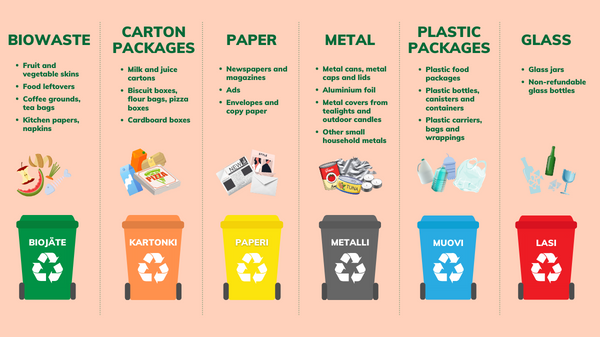
Ecological living includes waste sorting, recycling, and energy conservation. Hazardous waste (batteries, bulbs, solvents, gasoline, glue, paint, etc.) should not be disposed of with other waste but taken to designated collection points. Find out about hazardous waste collection points near your housing unit. Old medicines can be handed over to the pharmacy for proper disposal. Waste disposal instructions are available in the waste shed.
You can find Jätekukko’s sorting stations here: Sorting stations (in Finnish)
Recycling instructions:
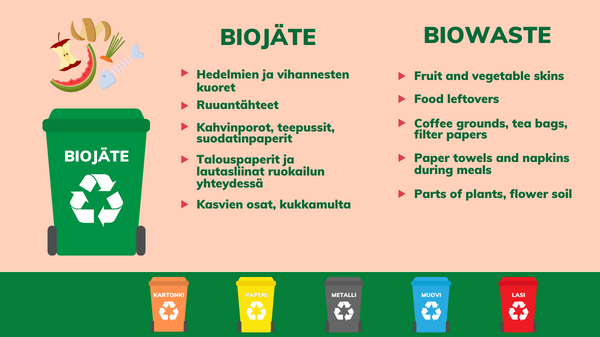
Biowaste:
- Peels of fruits and vegetables
- Food leftovers
- Coffee grounds with filter bags and tea bags
- Napkins and kitchen paper during meals
- Plant parts and flower soil
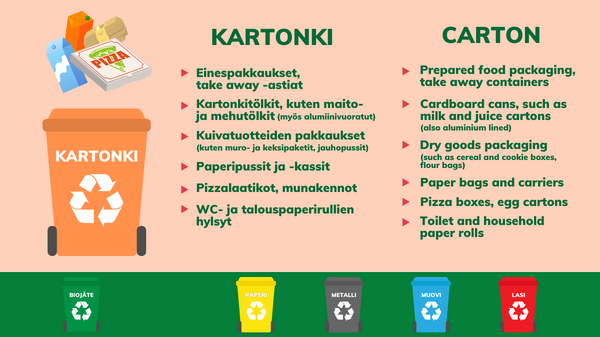
Carton packages:
(NOTE! Flatten! Dirty ones to mixed waste)
- Convenience food packaging, take-away containers
- Cardboard cans (such as milk and juice cartons)
- Packaging of dry goods (such as cereal and biscuit boxes, and flour bags)
- Paper bags and paper shopping bags
- Pizza boxes, egg cartons
- Toilet and kitchen paper roll tubes
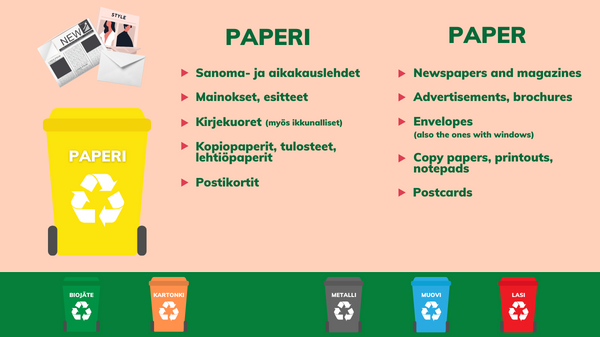
Paper:
- Newspapers and magazines
- Advertisements and brochures
- Envelopes
- Copy papers, prints, notepads
- Postcards
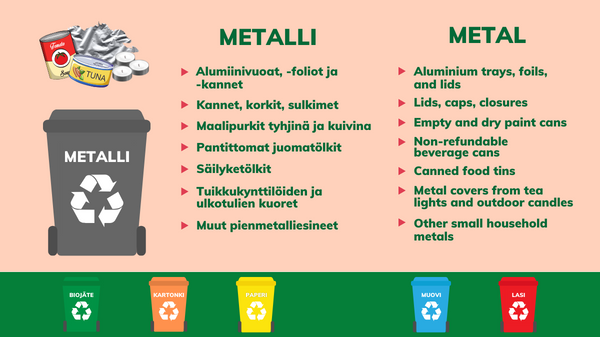
Metal:
- Aluminum trays, foils, and lids
- Caps, corks, and closures
- Empty and dry paint cans
- Non-deposit drink cans
- Shells of tealights and outdoor lights
- Canned goods
- Other small household metal items
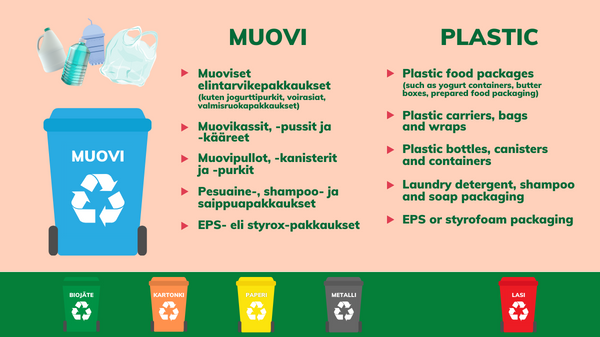
Plastic:
- Plastic food packaging (such as yogurt containers, butter tubs, ready-to-eat food packaging)
- Plastic bags, wraps, and films
- Packaging of detergents, shampoos, and soaps
- EPS or styrofoam packaging
- Plastic bottles, canisters, and jars
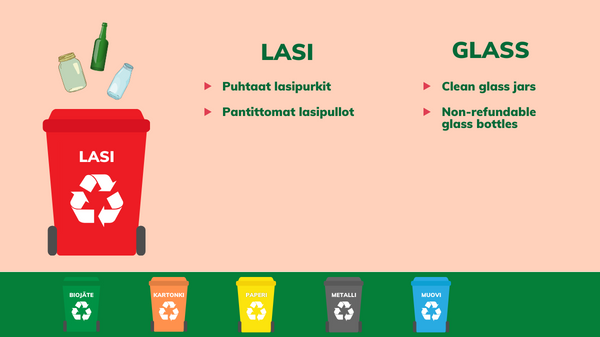
Glass:
- Clean glass jars
- Non-deposit glass bottles
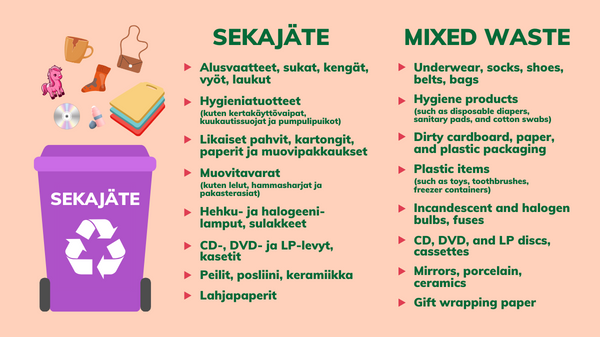
Mixed waste:
- Underwear, socks, shoes, belts, bags
- CD, DVD, and LP records, cassettes
- Hygiene products (such as disposable diapers, sanitary pads, and cotton swab
- Gift wraps
- Incandescent and halogen lamps, fuses
- Dirty cardboards, cartons, papers, and plastic packaging
- Plastic items such as toys, toothbrushes, and frozen food containers
- Mirrors, porcelain, ceramics
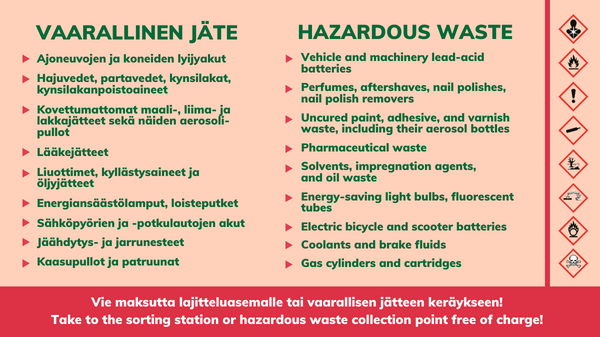
Hazardous waste:
- Cooling and brake fluids
- Lead-acid batteries from vehicles and machinery
- Batteries of electric bicycles and scooters
- Energy-saving lamps, fluorescent tubes
- Uncured paint, glue, and lacquer waste and their aerosol bottles
- Gas cylinders and cartridges
- Perfumes, colognes, nail polishes, nail polish removers
- Solvents, impregnating agents, and oil waste
- Pharmaceutical waste
Take hazardous waste to the sorting station or hazardous waste collection for free!
Other important instructions:
Always sort waste into the correct collection bins and close the lids. Do not leave rubbish in the building’s corridors or residential areas. Overflowing bins or scattered rubbish pose health risks and attract mice, rats, or birds that spread garbage and carry diseases.
Waste should be sorted into the designated collection bins. All Kuopas locations have a waste shed and collection bins.
Recycling of non-household waste is the responsibility of the tenant. NOTE! Do not leave furniture or other large items in the waste sheds or their vicinity.
Environmentally harmful waste (batteries, etc.) should be taken to designated collection points. Do not leave environmentally harmful waste in Kuopas collection bins.
You can read the Jätekukko sorting guide by clicking the button below:
Read more about ecological living in Kuopas here: Waste management and Recycling
Why is recycling important?
Recycling is an essential part of an ecological lifestyle and environmental protection. By sorting your waste correctly, you actively contribute to the reuse of raw materials and reduce the amount of waste ending up in landfills or being incinerated.
Even small changes in everyday choices can have significant positive impacts on our environment. Recycling helps save natural resources, reduce energy consumption, and minimize emissions of harmful substances into the atmosphere. Additionally, it helps decrease greenhouse gas emissions, which is crucial for mitigating climate change.
Thank you for doing your part for the environment! 🌍💚
